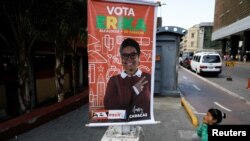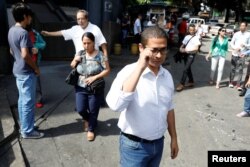The Venezuela National Electoral Council is making final preparations for Sunday’s municipal elections, which are expected to tighten leftist President Nicolas Maduro's grip on the beleaguered South American nation.
State owned Corporación Venezolana de Televisión (Venezuelan Television Corporation— VTV) is reporting the National Electoral Council had installed about 99 percent of the voting stations.
Venezuelan official Tania D’Amelio, who is overseeing the process of installing voting machines, urged voters to trust the election process.
National Electoral Council chief Sandra Oblitas said voting materials had been distributed so Venezuelans could exercise their constitutional right at the polls Sunday.
"These electoral processes have been carried out amid threats and attacks by those who do not believe in voting as a tool to resolve political differences," Oblitas said in denouncing the boycott.
According to reports, officials from the Council of Electoral Experts of Latin America have arrived in Venezuela to audit the elections.
The opposition Democratic Unity Roundtable (MUD) coalition refused to put up candidates for the 335 open mayoral seats, saying it had no confidence in a fair vote. Coalition candidates had been expected to win more than half of Venezuela's 23 governorships in a mid-October ballot, but they claimed only five after irregularities – including last-minute shifts in polling places and a shortage of voting machines in anti-Maduro neighborhoods.
Message to supporters
Maduro urged his supporters to go to the polls, saying another victory was necessary "to consolidate peace and recover prosperity." Venezuela was wracked earlier this year by violent political protests and suffers from ongoing, crippling shortages of food and medicine in the oil-rich country.
On Sunday, voters also must choose a new governor for western Zulia state. Opposition candidate Juan Pablo Guanipa's win in the October 15 election was annulled after he refused to pledge loyalty to the Constituent Assembly. The four other opposition winners promised their fealty to the pro-Maduro superlegislature, further fracturing the coalition.
With the mayoral elections, the ruling Socialist Party – which holds more than three-fourths of the seats – is likely to build its advantage. Of the remaining 76 mayors affiliated with the opposition, 13 have been arrested or are in exile.
That would give a broadened base of support to Maduro – elected in 2013 following the death of mentor Hugo Chavez – as he considers whether to seek another six-year term. Earlier this week, Venezuela officials threatened to halt presidential elections in 2018 unless the United States lifts financial sanctions it has imposed on Maduro and more than two dozen other government officials.
The European Union, Canada and Spain also have levied sanctions to pressure the Maduro administration to restore democratic functions.
Independent candidates
Though the coalition is boycotting the vote, some opposition candidates are running independently.
One is Robert García, who wants to become mayor of Chacao, a Caracas subdivision formerly led by political prisoner Leopoldo López and, more recently, the deposed and now exiled Ramón Muchacho.
"We are not giving up," García said. "We are participating, we are not giving up on our fight for our rights."
Venezuelans were split on whether to heed the opposition coalition's call to skip voting.
Javier Bellot, an electrician in Caracas, told VOA he doesn't plan to vote Sunday. "No, I will not participate" in the election, he said. "It's a fraud."
But Diego Medina, another Caracas citizen, said he'll exercise his right. "It's the least we can do. If we want this to change, we must participate."
Enrique Mendoza, opposition candidate for mayor of Sucre – a municipality in northern Miranda state – said observers at polling stations would be essential to prevent fraud.
"We want people to be there until the end" of polling, Mendoza said. "No matter what happens, they have to stay until the end."
Polls will be open Sunday from 6 a.m. to 6 p.m. local time.






